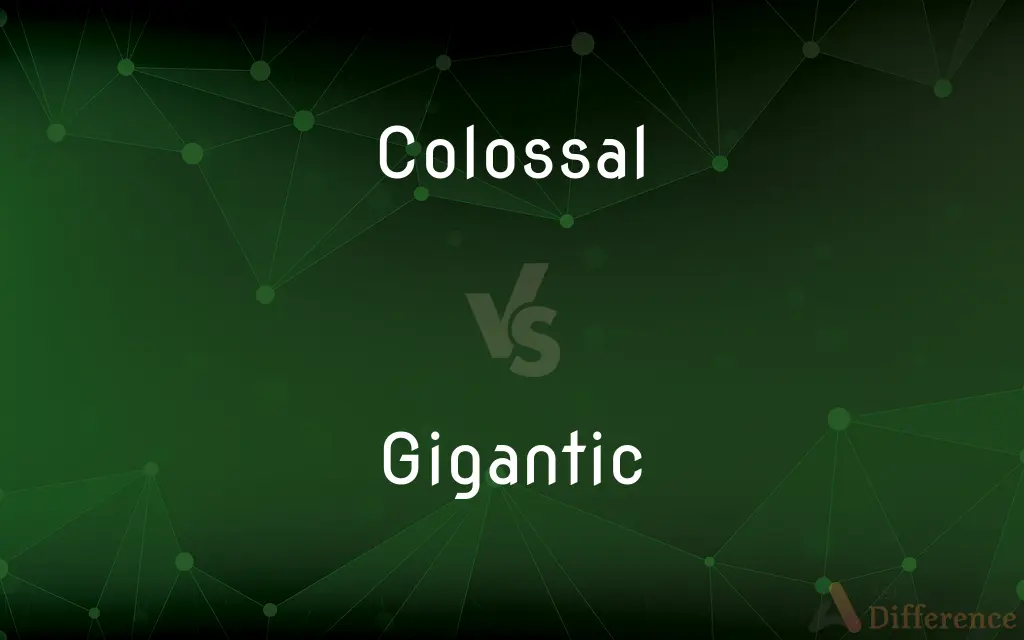Colossal vs. Gigantic — What's the Difference?
By Tayyaba Rehman & Urooj Arif — Updated on April 18, 2024
Colossal and gigantic both describe very large sizes, with colossal often implying an extraordinary or monumental scale, whereas gigantic generally means very large or immense.

Difference Between Colossal and Gigantic
Table of Contents
ADVERTISEMENT
Key Differences
Colossal often connotes something that is impressively large or beyond normal size, often used in a historical or monumental context. Gigantic, on the other hand, is commonly used to describe things that are extremely large without necessarily carrying a historical or extraordinary implication.
In literature, colossal is used to evoke a sense of awe or wonder, often in relation to man-made structures or mythic figures. Gigantic, whereas, is frequently used to describe natural phenomena or objects, emphasizing their sheer size rather than an awe-inspiring quality.
The use of colossal in everyday language can sometimes suggest an exaggeration or hyperbole, enhancing the grandeur or significance of an object. On the other hand, gigantic is more straightforwardly used to denote physical largeness, often without additional connotations.
Colossal can also imply a degree of success or impact, as in "a colossal achievement." Gigantic, meanwhile, refers more neutrally to size, as in "a gigantic tree," without suggesting additional layers of meaning.
In visual arts, colossal is often associated with sculptures or architecture that is grand and imposing. Gigantic is used to describe artworks that are notable primarily for their large scale, focusing on the visual impact of size alone.
ADVERTISEMENT
Comparison Chart
Connotation
Implies extraordinary size, often with a monumental aspect
Mainly denotes very large size
Usage in Literature
Evokes awe and wonder, often in historical contexts
Describes sheer physical size, often in nature
Implication
Can suggest exaggeration or significant impact
Typically neutral, focusing on physical dimensions
Common Contexts
Historical achievements, grand structures
Natural objects, animals
Associated Imagery
Grandiose, imposing
Massive, overwhelming
Compare with Definitions
Colossal
Immense, enormous.
The film was a colossal success.
Gigantic
Extremely large and powerful.
The company became a gigantic player in the tech industry.
Colossal
Monumentally impressive.
The event was a colossal display of talent.
Gigantic
Of a very great size or extent; huge or enormous.
The gigantic waves deterred the most experienced surfers.
Colossal
Of unusually great size or power.
The engine’s colossal power was unprecedented.
Gigantic
Very large; bigger than usual in size.
The gigantic pizza was enough to feed ten people.
Colossal
Very large in scale, extent, or degree.
They faced a colossal amount of data to process.
Gigantic
Markedly exceeding the normal size.
They built a gigantic replica of the historic ship.
Colossal
Extremely large or great.
The colossal statue dominated the city skyline.
Gigantic
Larger than the ordinary.
The child’s gigantic imagination filled the room with adventures.
Colossal
Of great size, extent, or amount; immense.
Gigantic
Exceedingly large in size, extent, or amount, especially for its kind
A gigantic toadstool.
Colossal
Of great scope or consequence; monumental
A colossal blunder.
Gigantic
Very great in scope or importance
A gigantic mistake.
Colossal
Extremely large or on a great scale.
A single puppy can make a colossal mess.
Gigantic
Very large.
Colossal
Amazingly spectacular; extraordinary; epic.
Gigantic
(slang) Excellent; very good or exciting.
This band is going to be gigantic.
Colossal
Of enormous size; gigantic; huge; as, a colossal statue.
Gigantic
In the manner of a giant. en
Colossal
Of a size larger than heroic. See Heroic.
Gigantic
Of extraordinary size; like a giant.
Colossal
So great in size or force or extent as to elicit awe;
Colossal crumbling ruins of an ancient temple
Has a colossal nerve
A prodigious storm
A stupendous field of grass
Stupendous demand
Gigantic
Such as a giant might use, make, or cause; immense; tremendous; extraordinarly; as, gigantic deeds; gigantic wickedness.
When descends on the AtlanticThe giganticStrom wind of the equinox.
Gigantic
So exceedingly large or extensive as to suggest a giant or mammoth;
A gigantic redwood
Gigantic disappointment
A mammoth ship
A mammoth multinational corporation
Common Curiosities
Can colossal and gigantic be used interchangeably?
While both describe large sizes, colossal often adds a nuance of grandeur or exaggeration.
What makes something colossal rather than just large?
It must not only be very large but also impressive or extraordinary in some way.
Is "gigantic" appropriate for describing achievements?
Yes, if referring strictly to their size or scale, not their impact.
What contexts are best suited for using "colossal"?
Best used when emphasizing monumental or awe-inspiring qualities.
Are there industries where colossal is preferred?
Yes, in film, architecture, and literature where grandeur is highlighted.
How does the public generally perceive these terms?
As synonyms for very large, though colossal might carry more weight.
Does gigantic have a positive or negative connotation?
It is neutral, emphasizing size without additional emotional connotations.
Which term would you use to describe a very large building?
Gigantic if emphasizing size alone, colossal if implying impressiveness.
What about gigantic in scientific contexts?
Often used to describe objects or phenomena of very large scale in science.
Can both terms be used metaphorically?
Yes, but colossal is more likely to be used metaphorically to suggest greatness.
Share Your Discovery

Previous Comparison
Flavourful vs. Flavoursome
Next Comparison
Asea vs. BewilderedAuthor Spotlight
Written by
Tayyaba RehmanTayyaba Rehman is a distinguished writer, currently serving as a primary contributor to askdifference.com. As a researcher in semantics and etymology, Tayyaba's passion for the complexity of languages and their distinctions has found a perfect home on the platform. Tayyaba delves into the intricacies of language, distinguishing between commonly confused words and phrases, thereby providing clarity for readers worldwide.
Co-written by
Urooj ArifUrooj is a skilled content writer at Ask Difference, known for her exceptional ability to simplify complex topics into engaging and informative content. With a passion for research and a flair for clear, concise writing, she consistently delivers articles that resonate with our diverse audience.














































